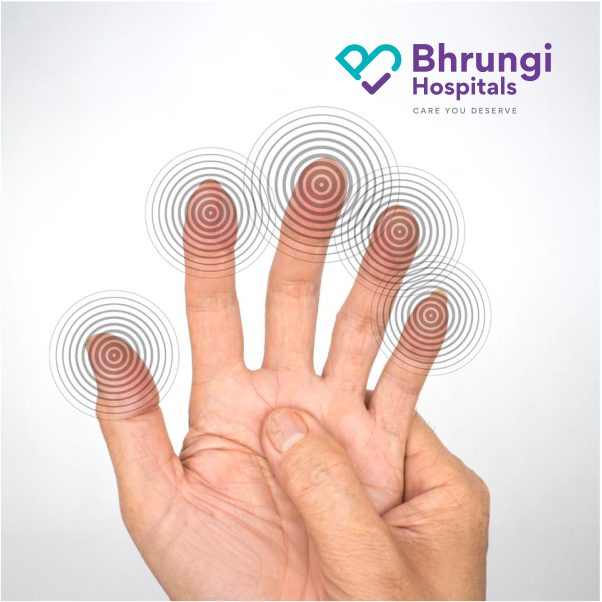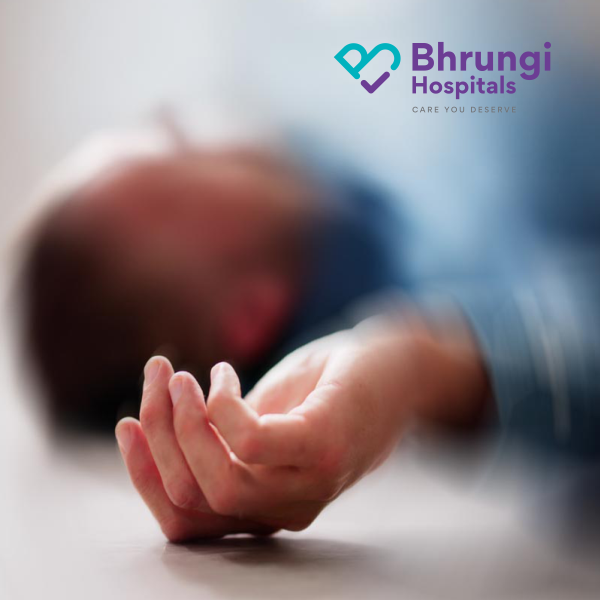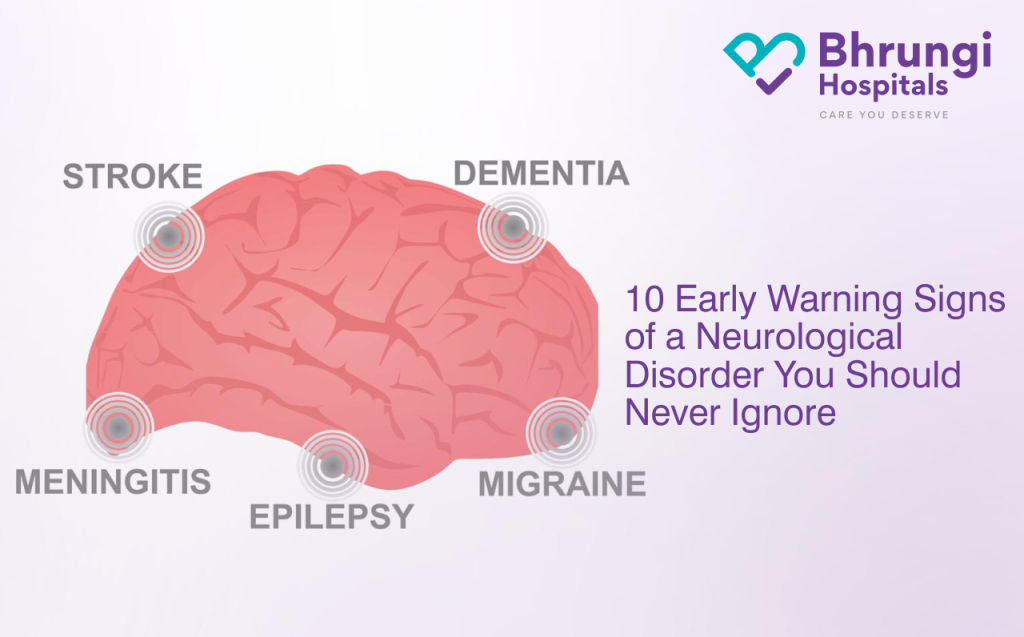The nervous system is your body’s command centre—responsible for everything from movement and sensation to memory, speech, and emotional health. Neurological disorders can affect anyone, at any age, and their early symptoms are often subtle, misinterpreted, or ignored. However, early recognition is key. Timely diagnosis and intervention can slow progression, improve outcomes, and sometimes even reverse damage.

Types of Neurological Disorders
- Stroke
Occurs when blood supply to part of the brain is interrupted or reduced, leading to brain cell damage. It can cause paralysis, speech issues, and memory loss. - Epilepsy
A chronic disorder marked by recurrent seizures due to abnormal electrical activity in the brain. - Parkinson’s Disease
A progressive neurodegenerative disorder that affects movement, causing tremors, stiffness, and difficulty with balance and coordination. - Multiple Sclerosis (MS)
An autoimmune condition where the immune system attacks the protective sheath (myelin) of nerves, leading to communication problems between the brain and body. - Alzheimer’s Disease
A form of dementia that gradually destroys memory, thinking skills, and the ability to carry out simple tasks. - Migraine and Chronic Headaches
Severe, recurring headaches often accompanied by nausea, light sensitivity, and visual disturbances. - Neuropathy
Refers to nerve damage, often causing numbness, tingling, or pain, especially in the hands and feet. Common in people with diabetes. - Brain Tumours
Abnormal growths of cells in the brain that may be benign or malignant, affecting brain function depending on their size and location. - Amyotrophic Lateral Sclerosis (ALS)
A rare neurological disease that affects nerve cells controlling voluntary muscle movement, leading to gradual paralysis. - Meningitis and Encephalitis
Infections that cause inflammation of the brain (encephalitis) or the protective membranes covering the brain and spinal cord (meningitis), often life-threatening if untreated.
10 Early Signs of Neurological Disorders
Here are 10 early warning signs of a neurological disorder that should never be ignored:
Persistent or Severe Headaches
Occasional headaches are common, but frequent, intense, or sudden-onset headaches—especially when accompanied by nausea, blurred vision, or confusion—may point to migraines, brain tumours, or raised intracranial pressure. Any unusual headache pattern should be evaluated promptly.

Unexplained Numbness or Tingling
A tingling or “pins and needles” sensation—especially on one side of the body or in the limbs—can be an early sign of nerve damage, multiple sclerosis, stroke, or peripheral neuropathy. If the sensation spreads or is paired with weakness, medical attention is needed.

Sudden Vision Changes
Blurred, double, or lost vision—whether temporary or persistent—can signal optic nerve issues, stroke, or neurological diseases like multiple sclerosis. Any unexplained visual disturbance warrants urgent assessment.
Muscle Weakness or Loss of Coordination
Weakness in the arms or legs, difficulty walking, or poor balance may reflect problems in the brain, spinal cord, or peripheral nerves. These symptoms could stem from conditions such as ALS, Parkinson’s disease, stroke, or multiple sclerosis.

Tremors or Involuntary Movements
Uncontrollable shaking, muscle twitching, or stiffness—especially when progressive—may indicate movement disorders like Parkinson’s disease. Such symptoms can start subtly but often worsen without treatment.

Seizures
Seizures don’t always involve dramatic convulsions. Brief lapses in awareness, unusual sensations, or sudden jerking movements can also be seizure-related. Even a single unexplained episode should be evaluated by a neurologist.

Memory Loss or Cognitive Changes
Sudden or worsening forgetfulness, confusion, difficulty concentrating, or problems with language may be early signs of Alzheimer’s disease, other dementias, or brain injury. Early diagnosis can help manage progression effectively.

Speech or Language Difficulties
If you or someone around you starts to slur words, struggles to speak clearly, or has trouble understanding language, it may be a sign of a stroke or other neurological impairment. Such symptoms are always considered a medical emergency.

Dizziness or Vertigo
Feeling lightheaded, unsteady, or experiencing spinning sensations can result from inner ear disorders or brain-related issues, including cerebellar dysfunction or stroke. Persistent or severe dizziness should not be ignored.

Mood or Behavioural Changes
Neurological disorders can impact mood and personality. Sudden depression, anxiety, irritability, or social withdrawal—especially when combined with other symptoms—can be signs of conditions affecting the brain.

When to Seek Help
If you or someone you know experiences any of the above symptoms—especially if they are new, persistent, or worsening—consult a neurologist without delay. Your body sends signals when something isn’t right. Listening to those signs and acting early can protect your brain, preserve your quality of life, and even save your life. Your nervous system is too important to ignore. Don’t delay—get the help you need.
Bhrungi Hospital- Providing you Comprehensive and Coordinated Care That You Deserve
With a focus on holistic recovery, Bhrungi Hospital stands as a leader in high-quality emergency and critical care services in a patient-centered setting. Our integrated approach combines expertise, advanced technology, and compassionate care, focusing on safety and transparency while remaining affordable and accessible to all patients in need.
- ACLS Ambulance with free service within 10KMs radius
- Ventilator Ambulance service available
- Call +91 7845 108 108 anytime, any day
- 100+Beds Multispecialty Hospital
- 24×7 Emergency Care






